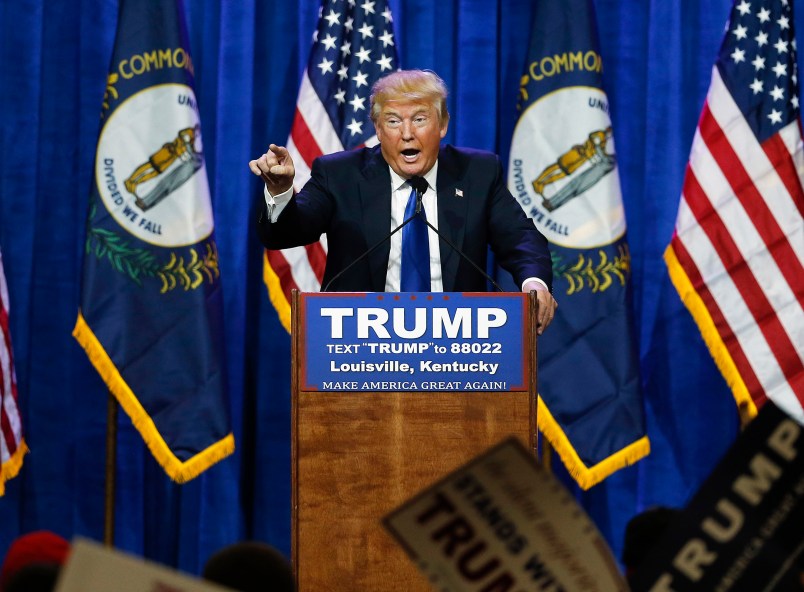Attorneys bringing a private lawsuit alleging a conspiracy between the Trump campaign and Russia to expose the private information of DNC donors and a DNC employee faced tough questioning from the federal judge in Washington, D.C. overseeing the case Thursday.
During arguments on motions filed by the Trump campaign and Roger Stone, who is also a defendant, to throw out the lawsuit, U.S. District Judge Ellen Huvelle directed most of her questioning at Protect Democracy Project attorney Benjamin Leon Berwick, whose group is representing the private plaintiffs bringing the case.
The plaintiffs allege that the Trump campaign and Stone, in conspiracy with the Russian government, violated two D.C. laws, by publicly disclosing private facts about them, as well as the federal Ku Klux Klan Act, by intimidating voters for their support of Hillary Clinton. The plaintiffs are two Democratic donors whose Social Security numbers were exposed in the Wikileaks hack of the DNC in 2016, and a DNC employee who says he was forced to leave his job due to the private emails of his that were released in the hack.
The bulk of discussions at Thursday’s hearing focused on whether D.C. was the proper place for the plaintiffs to bring their case. None of them live in D.C., and the Trump campaign, represented by Jones Day attorney Michael Carvin, argued that its operations were based mainly out of New York.
The plaintiffs’ lawyers pointed to the March 2016 Trump campaign meeting of the foreign policy team at the Trump hotel in D.C. — at which, meeting with Russians and the GOP’s Ukraine platform were allegedly discussed — as an event that allowed them to bring the case in D.C.
Huvelle peppered them with skeptical questions about where the alleged harm to plaintiffs occurred and when.
“They can conspire until doomsday, but the guy has to have injuries,” she said, while quizzing University of Michigan Law professor Richard Primus, another attorney for the plaintiffs, about why the release of emails caused the DNC employee to lose his job.
She brought up that the plaintiffs attorneys were not representing the DNC — which appears to been the main target of the Russian hacking campaign — and also that the DNC had filed its lawsuit alleging a Trump-Russia conspiracy in New York.
“That doesn’t help you, does it?” she asked Berwick.
The judge also took issue with the fact that the plaintiffs had not filed any examples of the hacked emails that had prompted the DNC employee to leave his job.
When Berwick offered to provide them to her after the hearing, she shot back, “It’s a little late, I would think.”
Robert Buschel, the attorney for Stone, did not spend much time at the podium. Stone was not at Thursday’s hearing, despite asking the judge in court filings permission to bring electronics into the courtroom.
Huvelle showed skepticism about how Stone fit into the allegations as well.
“He could be completely disreputable, he could be completely a prankster,” Huvelle said, referring to the terms used by the plaintiffs to describe the Trump ally. But that doesn’t give her the jurisdiction, she said, to let the case move forward.
Carvin argued that even if one believed everything the plaintiffs alleged in their complaint, there was a “fundamental disconnect” between what was alleged and what would be needed for the case against the Trump campaign to proceed in D.C.
He argued that if the Trump campaign had intended — in its alleged conspiracy with the Russians — to intimidate DNC donors, it wouldn’t have waited until just before Democratic National Convention to release their Social Security numbers. It would have released them as soon as the hackers got them, he said, or would have even threatened to release the Social Security numbers of anyone who donated.
Huvelle cautioned against a defense attorney arguing that his client didn’t commit the crime because if they had actually committed it they would have committed it better.
“I’m not sure that’s going to carry the day,” she said.







Oops.
Ouch.
Mayday! Mayday!
She carries the big clue stick.
A judge hasn’t had this much fun since Kris Kobach was last in court.